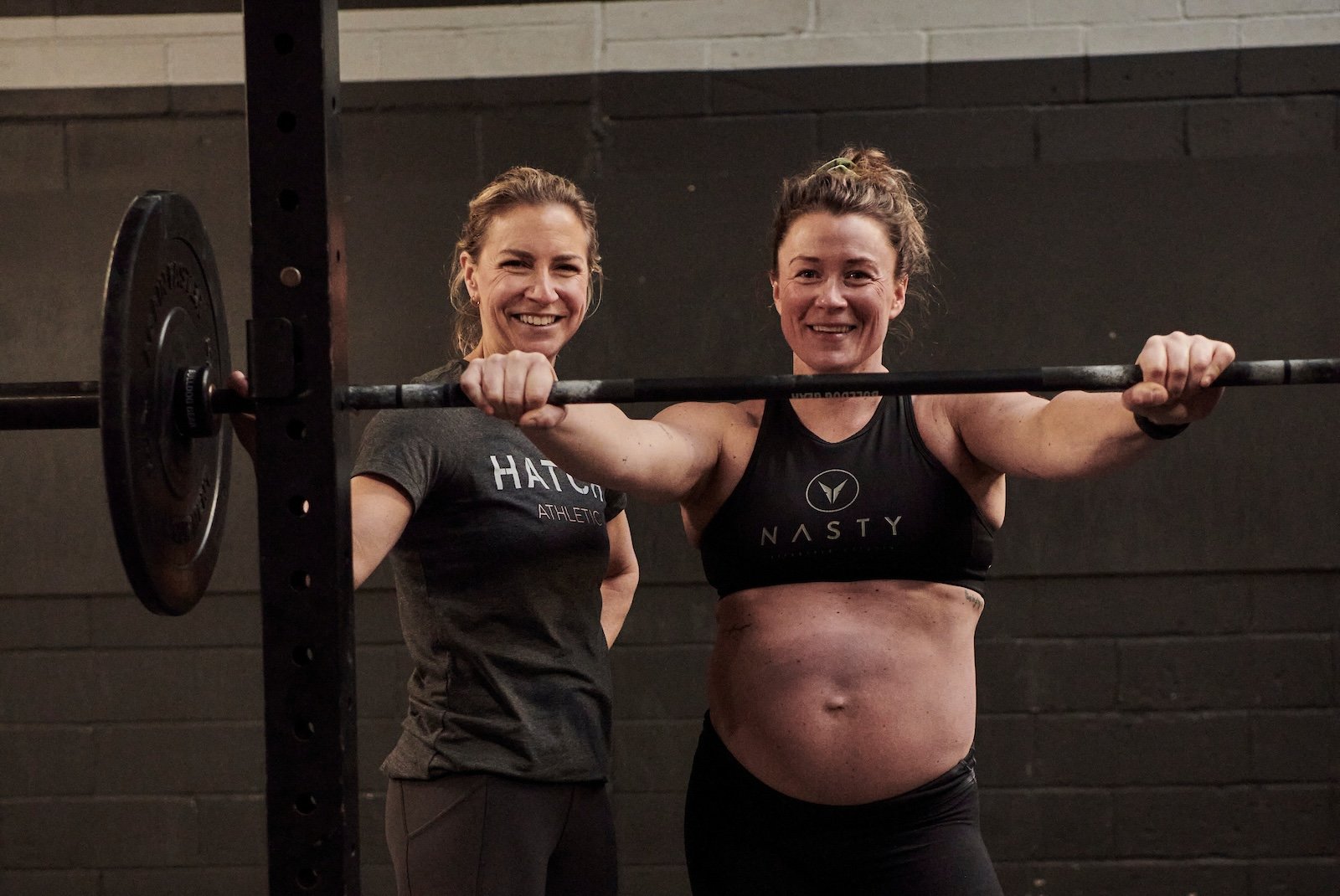How to know when your postpartum client is ready for more
Discover how to know when your postpartum client is ready for more. Find the balance between challenge and recovery with evidence-based coaching strategies.

If you’re a coach working with women through pregnancy and postpartum, you’ll know that the first six weeks after birth can feel like a grey area. Your client has just welcomed her baby, she’s in recovery mode, and you want to support her, but how do you balance care, professional boundaries, and your own coaching business?
In this guide, Kat, our founder and lead on HATCH COACH performance coaching and business modules, explores how perinatal coaches can bridge the early postpartum gap with both empathy and expertise. You’ll learn what to say, what gentle exercises might be appropriate, and how to use this stage to strengthen both your client relationships and your coaching business.
Your client has just had her baby. She's sent you the cutest little snap of her new arrival, maybe even shared a few details about her birth. She reassures you she’s doing “great”... but really, it’s that kind of hazy, surface-level “great” that new mums often default to when they’re still finding their feet.
Right now, she’s wrapped up in feeding schedules, sleepless nights, and a whole new identity, and she’s promised she’ll be in touch when she’s ready to train again.
So where does that leave you? As her perinatal coach, you want to support her without overstepping.
As her 1-to-1 trainer, you also have to think about the gap - both in her fitness journey and in your income.
The first 0–6 weeks postpartum can feel like a holding pattern for both coach and client. But it doesn’t have to be.
It's a delicate thing. There's a fine line between being the supportive coach she needs and not intruding during what can be a very private, and vulnerable, time.
In the very early days postpartum, your role is to hold space rather than step in with solutions. Your client might want to tell you everything about her birth and recovery, or she might want to keep it brief. Either way, follow her lead.
A good approach is to blend warmth with professionalism. Like when she sends that first baby photo, you might reply with something along the lines of:
“Congratulations, she’s beautiful! I’m so happy to hear you’re both doing well. I’ll leave you to soak up these precious early days, but just know I’m here if you need anything at all... whether that’s a quick chat, some gentle tips for recovery, or simply to share how you’re feeling.”
Don't make training the focus of early messages. Instead of asking “When do you want to get back to the gym?”, ask open, gentle questions like “How are you feeling in your body this week?” or “How are you finding these first few days?” If she wants to talk recovery or training, she will.
If your client asks what she can safely do in the first two weeks, keep it gentle and restorative. Focus on:
Diaphragmatic breathwork
Gentle, pain-free mobility and posture awareness
Education on body mechanics for feeding, lifting and carrying
Pelvic floor connection (contract and relax)
Reassurance that rest and recovery are part of the athletic journey
You could even share some free resources like our Return to Training after Vaginal Birth and Return to Training after C-Section eBooks, and encourage her to book an appointment with a women’s health physio.
By weeks 2–4, some clients may be ready to dip their toes into a little low-intensity movement. This is where your role as a HATCH COACH really matters. Use your professional judgment, lean on the information she’s shared with you, and make sure she’s completed her Get Active Questionnaire before anything begins.
The priorities at this stage are gentle cardiovascular activity, light strength, and reconnecting with her core and pelvic floor. Here are some great starting points:
Short walks (10–15 minutes, building gradually)
Light cycling on a static bike, if it feels comfortable
Core coordination between TVA and pelvic floor (think 5-second holds in different positions)
Gentle strength work like bridges, bird dogs, bodyweight squats and lunges
Mobility and stretching to support daily function and ease tension
If you’re a certified HATCH COACH, this is the perfect moment to lean on the Postpartum Framework and Postpartum ToolKit. With over 150 exercise examples, they’ll help you build safe, progressive, evidence-based sessions without second-guessing.
A couple of reminders:
Be mindful of any unusual sensations in the vaginal area, or increases in lochia (postpartum bleeding). If these crop up, dial things back.
Momentum might start to build here, which is exciting - but don’t forget the reality of chronic sleep deprivation and lifestyle shifts. Some weeks will go well, others may feel like setbacks. That’s normal.
Your role is to stay flexible, empathetic, and reassuring. With the right approach, you’ll help her feel supported, not pressured, and guide her through these early stages with confidence.
By weeks five to six, it’s a good idea to encourage your client to see a women’s health physio for a postpartum check-in. This assessment looks at posture, abdominal wall, and pelvic floor function, and gives both of you more confidence about moving into the next stage of training.
If all is well and your client is recovering without complications, you may find she’s ready to gently progress. That might include:
Building up to longer walks at a steady, moderate pace
Adding static bike sessions with slightly more intensity (if comfortable)
Continuing core coordination work, now integrating with functional movement patterns
Introducing postural and upper body strength (especially useful for mums who are baby-wearing or breastfeeding)
Progressing to single-leg strength like step-ups and split squats
Beginning light weight training to restore confidence and capacity
Even though things may feel like they’re moving forward, remind her that recovery is still very much active. Sleep, fuelling, and flexibility in her schedule matter just as much as what’s happening in the gym.
As always, watch for any red flags such as unusual vaginal sensations or a return/increase in bleeding. If these crop up, scale things back.
As a one-to-one postpartum coach, those first six weeks can feel like a dip - less contact time with clients and, in turn, less income. But this is where HATCH COACH comes in to give you a framework and tools to stay resourceful and confident.
With your HATCH COACH certification, you can:
Confidently create a digital “First 6 Weeks Postpartum” guide or mini-course for clients to follow safely at home
Offer online consults using evidence-based recovery advice from the HATCH COACH framework
Run group Q&As or membership sessions for postpartum clients not yet ready for in-person training
Use downtime to grow your prenatal client base or deliver workshops with guidance from the HATCH COACH materials
By diversifying your services with the support of HATCH COACH, you’ll continue to support clients fully while maintaining a sustainable business. It positions you as a knowledgeable perinatal coach and helps you navigate the inevitable peaks and troughs in client flow with confidence.
It’s always such an exciting moment when clients start returning to training postpartum, but it’s easy to get caught up in the ‘exercise’ side of things. As a HATCH COACH, this is your chance to set the gold standard in empathy, responsiveness, and flexibility.
Reassurance is everything. Rushing back too soon can actually slow progress, so it’s crucial to help your client return in the right order for the fastest, safest results.
Show her you care about her whole wellbeing, not just her workouts. Keep checking in, respect her boundaries, and adapt to any changes in her situation - especially in those early weeks and months. By positioning yourself as her long-term coach, you’re not just waiting for her to return; you’re actively supporting her through every stage of recovery. This approach builds trust, strengthens your client relationships, and ensures a more successful journey back to exercise.
Handle these early weeks with care and you’ll set your client up for success. Not only will she feel supported and confident, but you’ll also enhance your reputation, increase referrals, create a more sustainable income, and truly stand out as a go-to perinatal coach.
If you’re a coach who wants to stand out in women’s health and performance, HATCH COACH gives you the tools, knowledge and confidence you need.
With resources like the Postpartum Framework, Postpartum ToolKit, and our free eBooks, you’ll be equipped to:
Support women safely and effectively in the early postpartum weeks
Deliver tailored postpartum exercise plans backed by physiotherapy insights
Build a sustainable business that thrives across pregnancy, postpartum and beyond
Ready to become the go-to postpartum coach in your community? Learn more about the HATCH COACH certification today.
Aby Tobin, Women's Health Physiotherapist
5 min read
Discover how to know when your postpartum client is ready for more. Find the balance between challenge and recovery with evidence-based coaching strategies.
Kat, Hatch Founder & Women's Health Physio
4 min read
Regardless of your symptoms, here are a few exercise tips to keep you feeling great in the final stretch.
Elinor Harvey, Psychotherapist
4 min read
Discover how to reconnect with your body, pleasure, and identity during perimenopause with insights from a psychosexual therapist. Practical, compassionate support for finding your mojo again.
Kat, Hatch Founder & Women's Health Physio
6 min read
Discover how to coach women with a large diastasis recti safely and effectively. Learn expert postpartum fitness strategies from Hatch to restore core strength, improve function, and support long-term recovery.
